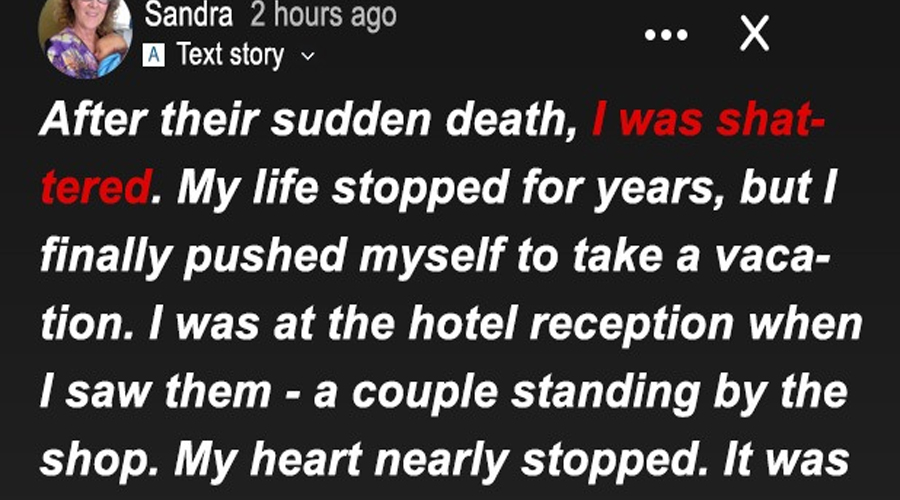A Ghost at the Beach
Miriam had planned this vacation for a long time. After years of sadness and pain, she finally booked a trip to the Bahamas. She needed peace, sunshine, and maybe a bit of joy. But nothing could have prepared her for what she was about to see.
As she stepped off the airport shuttle, the warm breeze wrapped around her like a hug. The salty air filled her lungs, so different from the dry, recycled air on the plane.
At sixty-five, this trip felt like a lifeline. Miriam had been through a lot. Five years earlier, she had stood over two coffins, saying goodbye to her daughter Pamela and son-in-law Frank. The car crash had left her heart broken. Every day since then had felt heavy.
Now, as she walked into the grand Ocean Club Resort, with its shining glass windows and sparkling white walls, she allowed herself a tiny smile. Maybe—just maybe—this was where the healing could begin.
The lobby buzzed with tourists. Kids laughed, couples wheeled suitcases, and glasses clinked in the nearby bar. Miriam looked around, trying to soak in the happiness all around her.
“Welcome to The Ocean Club, ma’am. May I have your name for check-in?” a cheerful receptionist asked.
Miriam blinked, pulled herself back to the present, and gave a small nod. “Leary. Miriam Leary,” she said, rummaging in her purse for her ID.
As the receptionist typed away, Miriam’s eyes wandered across the lobby. That’s when she saw them.
Her heart stopped.
Over by the gift shop, a woman with long brown hair picked up a seashell. Standing next to her was a man she knew just as well.
Pamela.
And Frank.
Miriam’s heart pounded so hard she thought it might burst. Her mouth went dry. No. It couldn’t be. They’re gone. They’re dead.
But there they were—smiling, relaxed, alive.
“Ma’am? Your room key,” the receptionist said again, her voice now distant.
Miriam grabbed the key without looking. She couldn’t take her eyes off them. They started walking toward the exit.
“Hold my bags,” she said quickly to the bellhop. “I’ll be right back.”
She rushed forward, breathless, weaving through people.
“Pamela!” she shouted, her voice full of emotion.
The woman turned.
Her eyes widened.
Miriam gasped. It was Pamela. No doubt.
Pamela grabbed Frank’s arm and whispered something. Frank turned and his face changed—from calm to pure panic.
They ran.
Miriam followed them, her sandals slapping the floor. “Stop right there!” she yelled, her voice echoing in the hotel driveway. “Or I’ll call the police!”
The couple froze. Shoulders tense. Slowly, they turned around.
Pamela’s eyes filled with tears. “Mom,” she said softly, “we can explain.”
Inside their hotel room, the air felt heavy. The walls were bright and cheerful, but the mood was anything but.
Miriam stood near the door, arms crossed, her voice firm. “Start talking.”
Frank spoke first. “Mrs. Leary… we never meant to hurt you.”
Miriam let out a bitter laugh. “Hurt me? I buried you. I mourned you. I cried every night for five years. And you think this isn’t hurting me?”
Pamela stepped forward. “Mom, please. We had our reasons.”
Miriam stepped back. “What reason could be enough for this kind of lie?”
Frank hesitated, then said, “We won the lottery.”
Miriam blinked. “The lottery?”
Pamela nodded slowly. “It was a lot of money, Mom. Enough to change everything. We didn’t want people coming after us. We just wanted a new life. No baggage. No drama.”
Miriam’s voice rose. “No obligations, you mean? Like the money you borrowed from Frank’s family? Or helping the cousins when their parents died?”
Frank’s jaw tightened. “We didn’t owe anyone anything. That money gave us freedom. We weren’t going to give it up for guilt trips.”
Miriam turned to her daughter. “And you agreed to all this? Pamela, how could you?”
Pamela looked away, voice trembling. “I didn’t want to, but Frank said—”
“Don’t put this all on me!” Frank snapped. “You were all in.”
Miriam’s eyes darted between them. Suddenly, she saw things clearly. Pamela looked small next to Frank. Afraid.
“Pamela,” Miriam said softly, “come home. We can fix this.”
Pamela hesitated. Her eyes lit up for a second. But Frank’s hand landed on her shoulder like a chain.
“We’re not going anywhere,” he said sharply. “Our life is here now. We have everything we need.”
Pamela looked down. “I’m sorry, Mom. I can’t.”
Miriam felt something inside her break again. She turned and walked out, her heart shattered once more.
She cut the vacation short. The beaches, the sun, the laughter—none of it mattered anymore. Her flight home was a blur of crying babies and static thoughts.
She kept asking herself the same questions: Was it a crime to fake your death? What were they really hiding? Could Pamela ever come back?
By the time she reached her cold, empty home, Miriam had made a decision. She wouldn’t report them. Not yet. Maybe… just maybe… Pamela would come back on her own.
Three Years Later
The years passed. Slowly. Painfully. Miriam tried to move forward. But the secret and the heartbreak never left.
Then, one rainy afternoon, someone knocked on her door.
Miriam opened it—and gasped.
Pamela stood there, soaked from the rain, arms wrapped around herself, eyes swollen with tears.
“Mom,” she said, her voice cracking, “can I come in?”
Miriam stared for a moment. Then she stepped aside.
Pamela walked in slowly, leaving a trail of rainwater on the floor. She looked like a ghost of the woman Miriam had seen in The Bahamas. No fancy clothes, no makeup. Just pain.
“What happened?” Miriam asked.
Pamela collapsed onto the couch. “It’s all gone,” she whispered. “The money. The house. Frank… he made some bad investments. Then he started gambling. I tried to stop him.”
She paused, then looked up, eyes full of shame. “He left. Took what was left and disappeared. I don’t know where he is.”
Miriam sat across from her. Her feelings were torn. She wanted to hold her daughter—but the anger, the betrayal, it still burned.
“Why are you here, Pamela?” she asked.
Pamela’s voice trembled. “I had nowhere else to go. I know I don’t deserve anything from you. But I miss you. I’m so sorry. For everything.”
Miriam was quiet for a long time. Then she said, “I can’t just forget what you did. Faking your deaths… that’s more than just lying. You hurt everyone. And you probably broke the law too.”
Pamela nodded, tears rolling down her cheeks. “You’re right. Frank didn’t want to pay taxes. That’s part of why we disappeared. The rest… the people we owed… he didn’t care.”
Miriam looked at her daughter, not with anger now, but with something closer to strength.
“If you want to make this right,” she said, “you need to tell the truth. Go to the police. Tell them everything—about the faked deaths, the money, the taxes. All of it.”
Pamela’s eyes went wide. “But I could go to jail.”
“Yes,” Miriam said quietly. “You might. I don’t want you to. But if you’re serious about fixing this, that’s the only way.”
For a moment, Pamela sat frozen. Then, slowly, she nodded. “Okay,” she whispered. “I’ll do it. I’ll tell them everything.”
Something shifted inside Miriam. Through all the pain, she felt a tiny spark of pride. Maybe her daughter was finally coming back to herself. Away from Frank. Away from the lies.
“Alright,” Miriam said, standing. “Let’s get you out of those wet clothes. Then we’ll head to the station.”
As they got ready to leave, Pamela turned. “Mom?” she asked. “Will you stay with me? While I talk to them?”
Miriam reached for her hand and squeezed it tight. “Yes,” she said, her voice full of love. “I’ll be there. Always.”
Pamela nodded, took a deep breath, and stood taller. “Let’s go.”
And Miriam, watching the fire in her daughter’s eyes, finally thought: There she is. There’s my girl.


